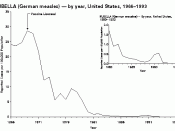Vaccines & Autism
Vaccines & Autism
MMR vaccines have been around since the late 1960's. Children between the ages of zero to six need many immunizations, but ultimately it is up to the parents to make that decision. Here in the United States immunizations are not mandated by the government. Considerable concern has been generated by theories that the MMR (Measles, Mumps, and Rubella) vaccine may be the cause of an apparent increase in the occurrence of autism among young children. This paper will explore the MMR vaccine, and why it could or could not cause Autism.
What is Autism? Autism is one of a group of developmental disabilities called ASD's (Autism Spectrum Disorders) that can cause detrimental communication, social, and behavioral challenges early on in childhood. According to the Center for Disease Control, it is estimated that an average of 1 out of every 100 children in the United States have an ASD.
ASD's can range from mild to severe and can affect each person differently. Depending on the type of ASD, there are differences in when the symptoms start, how severe or mild they are, and the exact nature of the symptoms. Individuals that have "classic" autism show signs of language delays, social and communication challenges, and uncommon interests and behaviors. Many also experience intellectual disabilities (CDC, 2010).
The MMR vaccine protects against measles, mumps and rubella and is very safe and effective. Individuals who receive this vaccine are usually provided with lifelong immunity against the disease. Measles is a respiratory disease that is highly contagious, and is among a leading cause of death among young children worldwide. People who get the measles are at a relatively high risk for blindness and brain infections (CDC, July 2010). The mumps are a contagious disease that...


